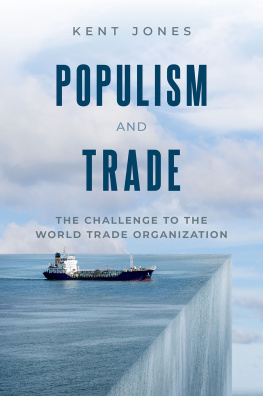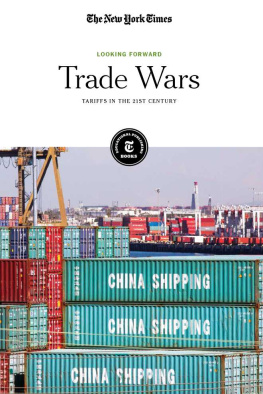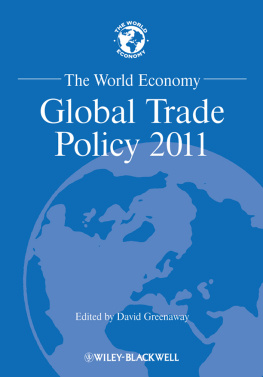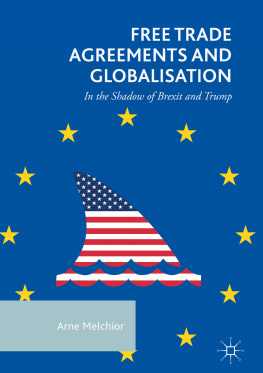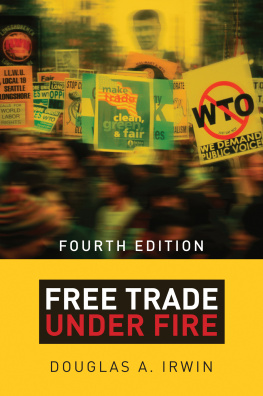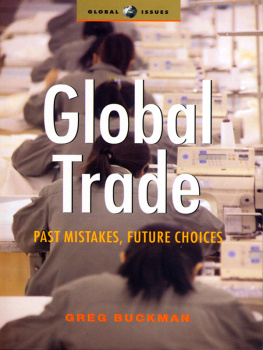Populism and Trade

Oxford University Press is a department of the University of Oxford. It furthers the Universitys objective of excellence in research, scholarship, and education by publishing worldwide. Oxford is a registered trade mark of Oxford University Press in the UK and certain other countries.
Published in the United States of America by Oxford University Press
198 Madison Avenue, New York, NY 10016, United States of America.
Oxford University Press 2021
All rights reserved. No part of this publication may be reproduced, stored in a retrieval system, or transmitted, in any form or by any means, without the prior permission in writing of Oxford University Press, or as expressly permitted by law, by license, or under terms agreed with the appropriate reproduction rights organization. Inquiries concerning reproduction outside the scope of the above should be sent to the Rights Department, Oxford University Press, at the address above.
You must not circulate this work in any other form and you must impose this same condition on any acquirer.
Library of Congress Cataloging-in-Publication Data
Names: Jones, Kent Albert, author.
Title: Populism and trade : The Challenge to the Global Trading System / Kent Jones.
Description: New York, NY : Oxford University Press, [2021] |
Includes bibliographical references and index.
Identifiers: LCCN 2020045695 (print) | LCCN 2020045696 (ebook) |
ISBN 9780190086350 (hardback) | ISBN 9780190086374 (epub)
Subjects: LCSH: Commercial policy. | Protectionism. | International trade
Political aspects. | PopulismEconomic aspects. | World Trade Organization.
Classification: LCC HF1411 .J624 2021 (print) |
LCC HF1411 (ebook) | DDC 382/.3dc23
LC record available at https://lccn.loc.gov/2020045695
LC ebook record available at https://lccn.loc.gov/2020045696
DOI: 10.1093/oso/9780190086350.001.0001
In memory of J. Michael Finger, 19392018
Trade Scholar, Visionary, Global Institutionalist
Contents
This book sets out to examine the impact of populism on national trade policies and international trade institutions, such as the WTO and regional trade agreements. It will argue that the implementation of populist trade policies by the United States has not only increased the implementation of protectionist policies, but has also damaged the basic rules-based framework of the global trading system. The economic nationalism it has inspired has severely undermined the principles of nondiscrimination, multilateralism, and peaceful dispute settlement that had previously established a predictable and stable trading order. The book project began as a response to a disturbingbut ultimately not surprisingtrend in the evolution of global trade institutions. As a student of trade policy in Geneva in the 1970s, in the shadow of GATT (later WTO) headquarters, I learned of the disastrous legacy of a chaotic world economy between the first two world wars, including beggar-thy-neighbor tariffs, crippling trade wars, and the Great Depression, with the world descending into World War II. In 1947 the victorious allied countries, led by the United States, established a new system of multilateral trade rules designed to avoid the self-destructive policies of the interwar period. For several decades thereafter, the world economy enjoyed unprecedented economic growth alongside multilateral trade liberalization and a remarkably robust adherence to GATT-WTO rules, with leadership from the United States and the European Union. Yet as my early mentor, Jan Tumlir, impressed upon me, global trade policy tends to follow a long wave of sequential learning and un-learning. The long period of trade liberalization, sparked by the lessons of the turbulent times that preceded it, appears now to have run its course. The biggest shocks to the trading system occurred in 2016, with two populist surprises. In June of that year, the United Kingdom voted in a referendum to leave the European Union, giving up its membership in an economic agreement that it had joined in 1974 primarily for the trade benefits it offered. The Brexit vote represented a populist renunciation of a European trade and integration agreement that had begun in 1951 as a renunciation of war among former enemies, and served as the exemplar of successful international cooperation among its 28 member countries. The second shock came later that year, as Donald Trump, an avowed protectionist, won the US presidential election. In a few short years, the new populist US president began to dismantle the very global trading rules the United States had so strongly supported since 1947. His policies were not just protectionist; they were designed to overturn an entire system of global cooperation and return to an atavistic nationalist trade policy of mercantilism and unilateral tariffs. Understanding the origins of the global populist zeitgeist and its impact on trade policy is the goal of this book.

